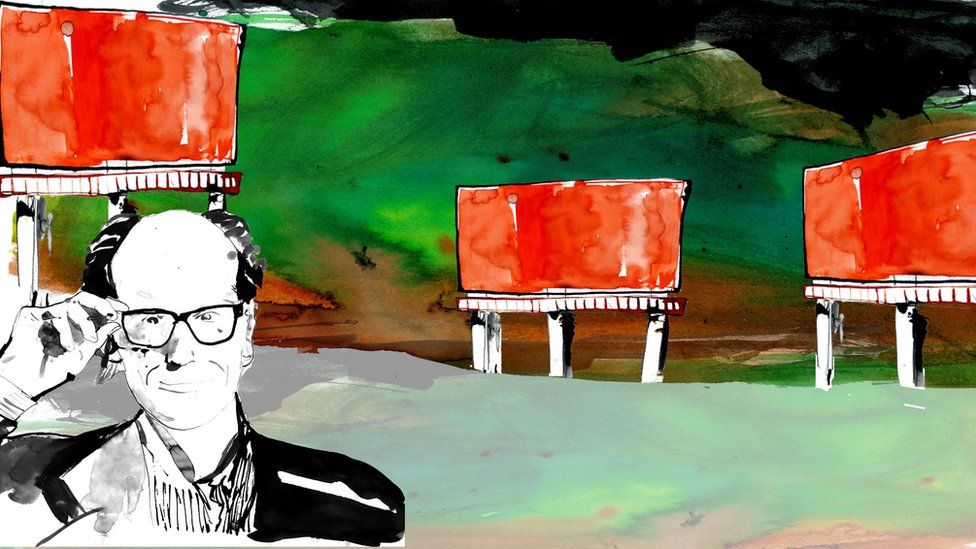Will Gompertz reviews Three Billboards Outside Ebbing, Missouri ★★★★★
- Published

Cast your mind forward a few weeks to the Dolby Theatre on Hollywood Boulevard at around 8pm (PST), Sunday 4 March.
Somebody, probably dressed in black with very good teeth, will be opening a golden envelope while simultaneously saying these words: "The Oscar for best actress in a leading role goes to…"
He or she will then pause for dramatic effect, pull out the card and say…
"Frances McDormand! - for Three Billboards Outside Ebbing, Missouri."
This will happen.
Her only serious competition comes from Sally Hawkins as the amphibian-loving janitor in Guillermo del Torro's fabulous film The Shape of Water, but McDormand edges it for giving life to the remarkable Mildred Hayes; a kick-ass, boiler-suited, bandana-wearing working class woman with a broken heart and a raging soul.
Mildred is an uncompromising, unflinching, and unappeasable big character from a small town who is destined to become one of cinema's great tragic lone-heroes.
She is not a vigilante, or a cop, or an ex-soldier. She is not tooled-up with lethal weapons nor is she a high-kicking exponent of the martial arts. Her armoury is much scarier.
Mildred Hayes is a furious, intelligent, grieving, middle-aged mother with the nihilistic courage of someone for whom consequences are inconsequential.
She's numb on the outside and dead within.
A little while back she had a silly argument with her teenage daughter about going out. In that tough-love, no-nonsense way of hers she said things she shouldn't have, like 'I hope you get raped'.
Her daughter got raped.
And was then set alight.
And then murdered.
As you can imagine, it devastates Mildred. Wrongs have to be righted. She needs closure.
The killer must be found.
Frustratingly for her, the police are taking a more laid back approach. They are less het up about things. So, having made a few enquiries to no avail they revert to their small-town ways, which Mildred describes as "goin' 'round torturing black folks."
What choice does she have other than to take matters into her own hard-skinned hands?
She rents three disused, dilapidated billboards on the Drinkwater Road just outside the fictional town of Ebbing, Missouri and places the following message on them in huge black letters set against a blood-red background:
Billboard 1: RAPED WHILE DYING.
Billboard 2: AND STILL NO ARRESTS?
Billboard 3: HOW COME, CHIEF WILLOUGHBY?
And with that the film is set-up.
What follows is one of the finest black comedies I have seen this century.
Anyone who has watched the plays The Lieutenant of Inishmore or The Pillowman knows Martin McDonagh is a writer of rare wit and virtuosity. If you've seen In Bruges you'll know he can direct too. But he takes the two art forms to another level in Three Billboards, which he wrote specifically for Frances McDormand.
She is not the only star of the show.
Woody Harrelson is terrific as Ebbing's revered Police Chief Willoughby who tries playing the 'but I'm dying of cancer' compassion card on Mildred, who promptly trumps it by suggesting he uses his terminal condition as a motivation to get her daughter's case solved sooner rather than later.
Dixon is Willoughby's dim-witted, racist, violent mummy's boy of a junior officer. In the wrong hands the character would be little more than a two-dimensional cartoon thicko - a sort of Beavis and Butthead rolled into one bigoted, bullying buffoon - but Sam Rockwell manages to mine Dixon's shallows and successfully find his humanity and humility.
John Hawkes as Mildred's ex-husband Charlie is the one person she cannot overcome with her brooding fury. He adds an extra layer of oily darkness to an already very black comedy with his cheap put-downs - "you don't have to explain yourself to me 'cause you're having dinner with a midget, Mildred" (she was) - and heartless jibes glibly tossed into her open wound of guilt.
He can get away with taking her on; after all, he has lost a daughter too. But the same does not apply to the cocky schoolboy who lobbed a projectile at her car. He won't be doing that again.
He'll be telling his friends the same thing I am telling mine: make sure you look out for Mildred Hayes.
She's something else.
As is this film, which captures the insular nature of life in a rural community with heart and soul and humour.
It's a very well written, beautifully shot, expertly told story: it is a modern classic.
- Published17 September 2017